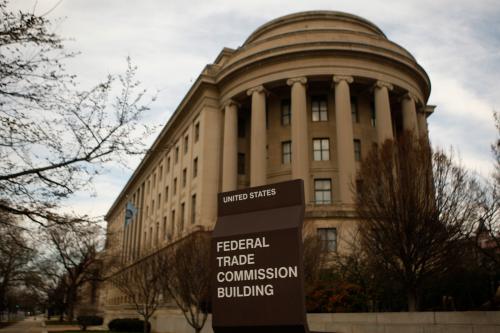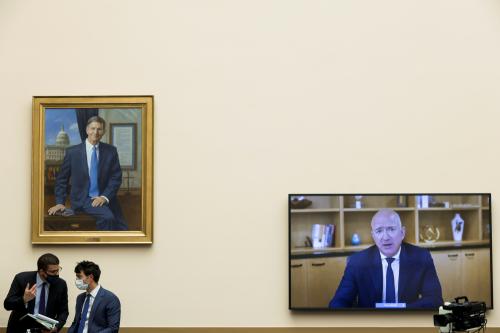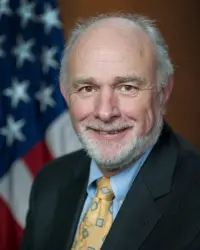On October 1, 2020, Brookings Visiting Fellow and former Assistant Attorney General for Antitrust Bill Baer testified before the U.S. House Judiciary Subcommittee on Antitrust, Commercial, and Administrative Law in a hearing titled “Proposals to Strengthen the Antitrust Laws and Restore Competition Online”. In his testimony, Baer analyzes where enforcement has been successful and where it has failed to protect consumers and competition. Baer also offers recommendations to improve antitrust laws, enforcement policies, judicial interpretation, and more to support the economy. The full testimony was originally submitted to the subcommittee as a letter on May 19, 2020.
Chairmen Cicilline and Nadler and Ranking Members Sensenbrenner and Jordan,
Thanks for the opportunity to appear today and thanks for the courage and tenacity the Subcommittee has shown in tackling the role of antitrust law in our 21st Century economy.
I bring the perspective of someone privileged to have served on the front lines of antitrust enforcement in four different administrations, twice at the FTC and most recently as head of Antitrust at DOJ.
That experience teaches me that in many cases our antitrust laws have been successful and a force for good. But too often antitrust jurisprudence has fallen short and failed to protect consumers and competition as much as it can and should.
My submission makes four basic points:
- Antitrust enforcement needs to be based on an analytically sound, fact-based framework;
- But we cannot let the perfect be the enemy of the good, and many courts hold enforcement to an effective standard of proof that is unrealistic and inconsistent with the plain language of our antitrust statutes;
- If the courts are unwilling to step back from bias against the risk of over-enforcement, legislation is needed to reset the balance; and
- More resources are needed if antitrust enforcement is to fulfill its role as the economic cop on the beat.
I was on the scene in the 1970s as the Chicago School came to narrow dramatically the focus of antitrust—mostly to price fixing and a few mergers to monopoly or near monopoly. The Chicago School, as former FTC Chair Bob Pitofsky put it, “overshot the mark”. We went from a place in the 1960s where Justice Potter Stewart complained that the only consistency he could find in Supreme Court antitrust decisions was that the “government always wins” to a 25-year Dark Age where the government invariably lost.
We moved the needle somewhat in the late 1990s, convincing the courts to block consolidation among office supply superstores and drug wholesalers and sustain challenges to efforts by firms like Microsoft and Toys “R” Us to limit opportunities for rivals to compete. Those modest successes continued over the last two decades, as some courts recognized the anticompetitive impact of hospital consolidation and “pay for delay” agreements between brand name and generic pharma manufacturers.
But looking back at the cases where the government prevailed in the last 20-plus years helps explain why concentration and market power have increased. Invariably, where the government won an antitrust challenge, the government’s evidence was overwhelming: mergers to monopoly or near monopoly and transparently bad conduct by dominant firms. In close cases, the government typically lost or the enforcers never brought the case in the first place, out of fear that the courts would rule against and make bad law.
How did we get there?
In my view, the fear of getting it wrong warped antitrust enforcement. Antitrust jurisprudence today is too cautious, too worried about adverse effects of “over enforcement” (so called Type I errors). Bias against enforcement has caused many courts to demand a level of proof that is often unattainable. That chills enforcement, limits our ability to challenge conduct or acquisitions of potential rivals—especially in the technology sector where firms benefiting from network effects can acquire enduring market power.
What should we do about it?
We need to change current law to direct the courts and antitrust enforcers to be more assertive in challenging conduct and consolidation that risks creating or enhancing market power. Modest changes will suffice: by incorporating presumptions that certain behaviors are likely to reduce competition, making it clear that showing a risk of a reduction in competition is sufficient, emphasizing that anticompetitive effects include price and quality and innovation competition, and legislating to overrule recent problematic court decisions, Congress can make a meaningful difference.
And we need to consider forward-looking rules and legislation that will enhance competition. We have ample precedent. The 2004 FCC rule allowing consumers to “port” their phone numbers to competing carriers gave consumers the economic power to reward those with lower rates and better service. It forced incumbent carriers to compete like never before. Those sorts of tools—portability and interoperability—can help restore markets to a competitive equilibrium.
Congress can also needs to fund antitrust enforcement. We today spend 18% less on antitrust enforcement than in 2000, despite increasing concentration and the growing number of dominant firms in a much larger economy. We need funding both to bring enforcement actions and to allow for after-action studies of what happened in markets where the agencies decided not to bring enforcement actions or where the courts rejected an antitrust challenge.
We can do more and we can do better. Again, thank you for the opportunity to appear here today.
Click here to read the full testimony, and watch video of the hearing below.






Commentary
TestimonyImproving antitrust law in America
October 1, 2020